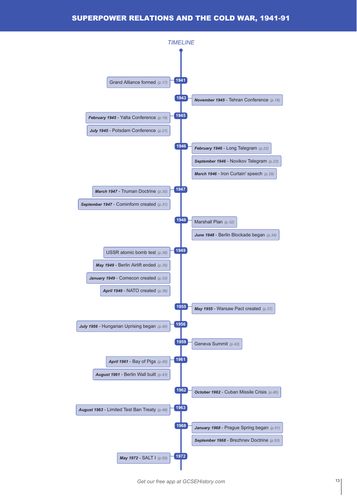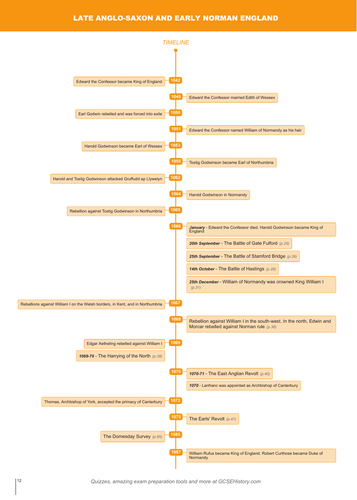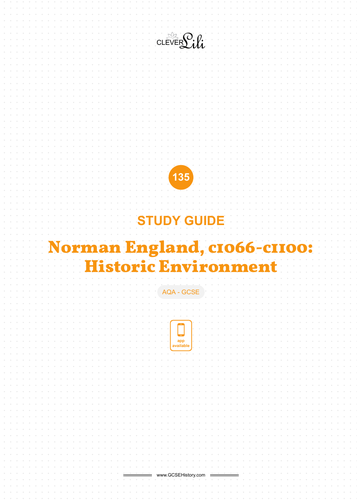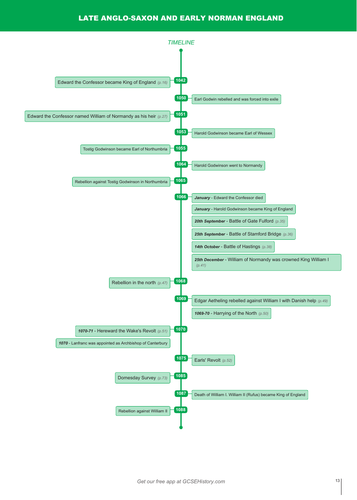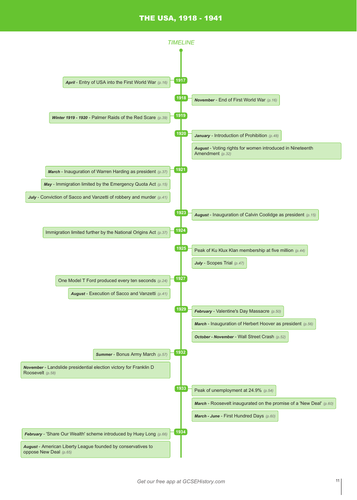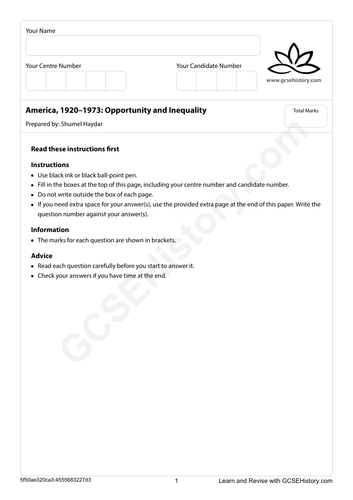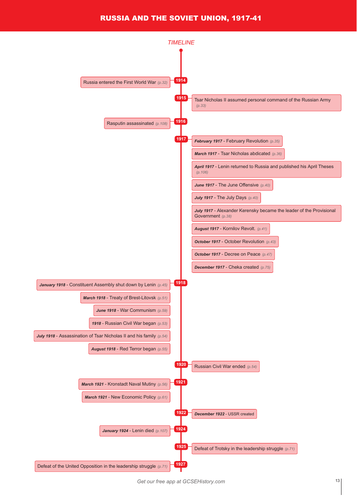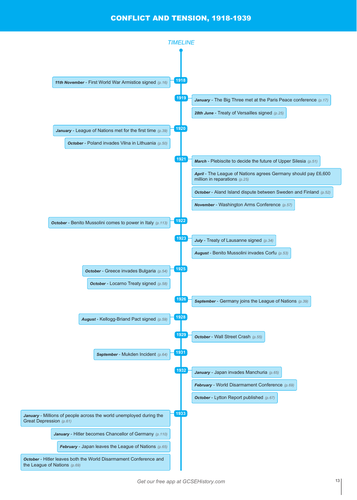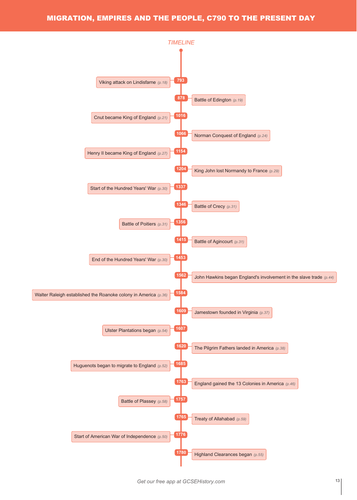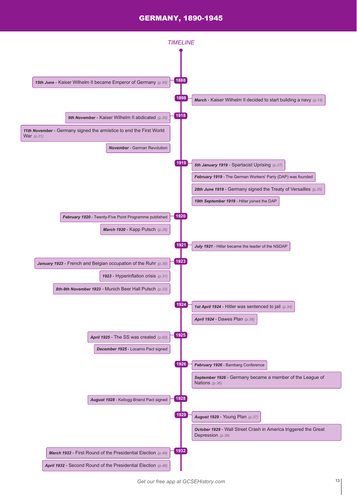112Uploads
43k+Views
17k+Downloads
All resources

Timeline - Edexcel GCSE Superpower Relations and the Cold War, 1941–91
This timeline is an extract from from a Study Guide by Clever Lili.[https://www.gcsehistory.com/bookstore/ed_gcse_cold_war.html]

Timeline - AQA Norman England, c1066–c1100
This timeline is an extract from from a Study Guide by Clever Lili.[https://www.gcsehistory.com/bookstore/aqa_gcse_norman_england.html]

Castle Acre Priory - historic environment
This is Castle Acre Priory - historic environment add on to AQA - GCSE
Norman England, c1066–c1100 https://www.gcsehistory.com/bookstore/aqa_gcse_norman_england.html

Glossary - AQA Norman England, c1066–c1100
This glossary is an extract from from a Study Guide by Clever Lili.[https://www.gcsehistory.com/bookstore/aqa_gcse_norman_england.html]
AQA Norman England, 1066-c.1100 is a British depth study that investigates how England changed and developed following the Norman Conquest in 1066. The course focuses on the period from 1066 to the years around the accession of Henry I in 1100. You will focus on crucial events during this period, and study the different social, cultural, political, economic and religious changes that occurred. You will also investigate a specific historical site in detail to examine the relationship between the site and events during this time period.

Timeline - Edexcel GCSE Anglo-Saxon and Norman England, c1060–88
This timeline is an extract from from a Study Guide by Clever Lili.[https://www.gcsehistory.com/bookstore/ed_gcse_anglosaxons_norman_conquest.html]

Timeline - Edexcel IGCSE The USA, 1918–41
This timeline is an extract from from a Study Guide by Clever Lili.[https://www.gcsehistory.com/bookstore/ed_igcse_usa_1918_to_1941.html]

Mock Paper - AQA - America, 1920–1973: Opportunity and Inequality
You can create a complete mock paper like this one on your chosen AQA unit in one click. Change the questions if you like and download. It’s so fast your mock paper will be ready and printed before your cuppa is ready. [GCSEHistory.com]

Timeline - Edexcel - GCSE Russia and the Soviet Union, 1917–41
This timeline is an extract from from a Study Guide by Clever Lili.[https://www.gcsehistory.com/bookstore/ed_gcse_russia_and_the_soviet_union.html]

Glossary - Edexcel GCSE Medicine in Britain, c1250–present and the British Sector of the Western F
This glossary is an extract from from a Study Guide by Clever Lili.[https://www.gcsehistory.com/bookstore/ed_gcse_medicine.html]
Edexcel GCSE Medicine through time, c1250 - present, is a thematic study that looks at the change and continuity of medicine through British history. You will study the main people, events and developments, as well as the significant features of the different ages, from medieval to modern times. In studying the Western Front during the First World War, you will investigate a historic environment that was significant to the development of medicine.

Timeline - AQA Conflict and Tension: the Inter-War Years, 1918–1939
This timeline is an extract from from a Study Guide by Clever Lili.[https://www.gcsehistory.com/bookstore/aqa_gcse_conflict_tension_1918_39.html]

Timeline - AQA Britain: Migration, Empires and the People, c790 to the Present Day
This timeline is an extract from from a Study Guide by Clever Lili.[https://www.gcsehistory.com/bookstore/aqa_gcse_mep.html]

Timeline - AQA Germany, 1890–1945: Democracy and Dictatorship
This timeline is an extract from from a Study Guide by Clever Lili.[https://www.gcsehistory.com/bookstore/aqa_gcse_germany_1890_45.html]

Glossary - Edexcel GCSE Early Elizabethan England, 1558–88
This glossary is an extract from from a Study Guide by Clever Lili.[https://www.gcsehistory.com/bookstore/ed_gcse_elizabeth.html]
Edexcel GCSE Elizabethan England 1558-1588 investigates how England was ruled under Queen Elizabeth I. The course focuses on the first 30 years of Elizabeth’s reign. You will focus on crucial events during this period, and study the different social, cultural, political, economic and religious changes that occurred.

Glossary - Edexcel IGCSE Germany: Development of a Dictatorship, 1918–45
This glossary is an extract from from a Study Guide by Clever Lili.[https://www.gcsehistory.com/bookstore/ed_igcse_germany_1918_45.html]
Edexcel IGCSE Germany: development of dictatorship, 1918-45 is a modern depth study that focuses on the origins of the Weimar Republic, the challenges it faced and to what extent it overcame them. The course also investigates why and how the Weimar Republic was dismantled by the Nazis, replaced by a dictatorship and then changed by the Second World War. You will focus on crucial events during this period, and study the different social, cultural, political, economic and military changes that occurred.

Glossary - Edexcel IGCSE The USA, 1918–41
This glossary is an extract from from a Study Guide by Clever Lili.[https://www.gcsehistory.com/bookstore/ed_igcse_usa_1918_to_1941.html]
Edexcel IGCSE The USA, 1918 to 1941 is an Edexcel iGCSE Breadth Study. It covers the changes in the American society, economy and political system from the end of the First World War to the USA’s entry into the Second World War, covering the economic boom, Wall Street Crash, Depression and New Deal, as well as examining the social changes and political ideas that shaped the period.

Glossary - CIE International Relations: Were the Peace Treaties of 1919–23 Fair?
This glossary is an extract from from a Study Guide by Clever Lili.[https://www.gcsehistory.com/bookstore/cie_igcse_international_relations_versailles_settlement.html]
The title of the first unit in the Core Content of Option B in the CiE History iGCSE is ‘Were the peace treaties of 1919-1923 fair?’ This unit investigates the post-First World War peace treaties of 1919-1923.

Glossary - Edexcel GCSE Superpower Relations and the Cold War, 1941–91
This glossary is an extract from from a Study Guide by Clever Lili.[https://www.gcsehistory.com/bookstore/ed_gcse_cold_war.html]
Edexcel GCSE Superpower relations and the Cold War, 1941-91 is the period study that investigates the causes of the Cold War, three of its key crises and the reasons it ended. You will study the role key individuals played during the Cold War, as well as how it impacted specific countries. You will focus on crucial events during this period, and study the political, economic and military changes that occurred.

Glossary - AQA Conflict and Tension: the Inter-War Years, 1918–1939
This glossary is an extract from from a Study Guide by Clever Lili. [https://www.gcsehistory.com/bookstore/aqa_gcse_conflict_tension_1918_39.html]
AQA Conflict and Tension 1918-1939 is an AQA wider world depth study that investigates international relations. The course focuses on what caused the Second World War. It considers how and why the war happened, and why it was so challenging to find resolutions to the issues which caused it. You will study the roles of key individuals and groups in influencing change, and how they were affected by and shaped by international affairs.

Glossary - AQA Conflict and Tension: The First World War, 1894–1918
This glossary is an extract from from a Study Guide by Clever Lili. [https://www.gcsehistory.com/bookstore/aqa_gcse_conflict_and_tension_1894_to_1918.html]
AQA Conflict and Tension 1894-1914: the First World War is a wider world depth study that investigates international relations. The course focuses on the causes and course of the First World War. It considers how and why the conflict occurred, as well as why it lasted so long.

Glossary - AQA Britain: Power and the People, c1170 to the Present Day
This glossary is an extract from from a Study Guide by Clever Lili.[https://www.gcsehistory.com/bookstore/aqa_gcse_power_and_the_people.html]
AQA Power and the people 1170 to the present day is a thematic study. The course focuses on key events in British history and how they have affected the relationship between the government, the monarchy and the citizen. You will study key events, key individuals and the ideas that have contributed to the development of the Britain we know today.

